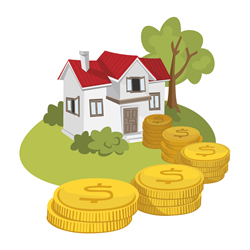 More and more retirees are turning to what used to be a little-recognized asset for income in retirement: their home equity. For those wanting to tap into their home equity, many think they have to choose between two options: selling the home or getting a home equity loan. But, for those seniors who would like to remain living in their home and those wanting to eliminate their monthly mortgage payment, there is another option – a reverse mortgage.
More and more retirees are turning to what used to be a little-recognized asset for income in retirement: their home equity. For those wanting to tap into their home equity, many think they have to choose between two options: selling the home or getting a home equity loan. But, for those seniors who would like to remain living in their home and those wanting to eliminate their monthly mortgage payment, there is another option – a reverse mortgage.
Home Equity Conversion Mortgage (HECM) loans, also commonly known as Home Equity Conversion Mortgages (HECMs), are available to senior homeowners who are 62 years and older, and allow borrowers to convert a portion of their equity into cash without having to sell their home or continue paying a monthly mortgage payment. The loan is typically due when the borrower permanently leaves the home. What makes this loan option unique is the fact that instead of the borrower making payments to the lender, the process is reversed with the borrower receiving payments from the lender. This distinct feature has made this loan product a popular alternative among seniors across the nation.
History of Reverse Mortgages
Before reverse mortgages, a borrower had limited options to tap into their equity. Fortunately, in 1961, the first reverse mortgage loan was written as a solution to help a widow afford to stay in her home despite having just lost her husband. Since then, the concept of an "actuarial mortgage plan in the form of a housing annuity" has gained popularity. In 1988, President Ronald Reagan signed the reverse mortgage bill into law, establishing the loan product as a government-insured loan. Today, reverse mortgages are considered a safe financial tool for seniors who want to supplement their retirement income.
Reverse Mortgage Misconceptions
Compared with the time-honored traditional mortgage, reverse mortgages are relatively new. Therefore, it is no surprise that they are sometimes misunderstood. The following are common misconceptions voiced by many about this financial product, and the truth about them.
Misconception: The lender will take the title and ownership of my home.
Reality: The lender does not take the title of a home from the borrower. The borrower remains the owner of the home and keeps title as long as all loan terms are met, including continuing to pay for property taxes, insurance, and home maintenance.
Misconception: I risk all my assets if I take on this loan and I can end up owing more than the house is worth.
Reality: HECM reverse mortgages are non-recourse loans, meaning that neither you nor your heirs will ever owe more than the loan balance or the value of the property, whichever is less; and no assets other than the home must be used to repay the debt.
Misconception: Once I close my reverse mortgage loan, I have no more financial obligations.
Reality: Financial obligations do not end at loan closing. Borrowers must ensure they continue maintaining all necessary homeowners insurance, paying all property taxes, and keeping up with home repairs.
How a Reverse Mortgage Can Help
For many senior homeowners, reverse mortgage loans may be beneficial in various ways. While each person’s circumstances are unique, a reverse mortgage has proven helpful to many in the following ways:
Reverse mortgages eliminate a monthly mortgage payment.
One stipulation of a reverse mortgage is that it is the only lien on your home. This means that if you already have an existing mortgage on your home, the funds first goes towards paying off your existing loan. Consequently, this will eliminate your usual monthly mortgage payment, so the money that used to be budgeted for this payment becomes free for other uses. You will only need to continue to pay your property taxes and insurance, as well as for home maintenance.
Reverse mortgages set aside funds for necessary repairs and maintenance for the home.
With a reverse mortgage, upkeep of the home is necessary because the eventual repayment of the loan is dependent upon the home's value. Therefore, if certain repairs are found to be necessary during the appraisal of the home, a portion of the funds may be set aside to pay for them. For borrowers who, for example, need to replace a leaky roof or fix broken stairs, the set aside amount can help complete these long-needed repairs.
Reverse mortgages allow a borrower to age at home.
The reverse mortgage loan was designed with the purpose of helping borrowers age in place in the comfort of their homes. According to the Joint Commission Home Care Program, “Home — The Best Place for Home Health Care,” not only can care be provided less expensively in the home, evidence suggests that home care is a key step toward achieving optimal health outcomes for many patients.” Reverse mortgages allow senior homeowners the funds to continue living in their home and afford services such as in-home healthcare.
Reverse mortgages allow a borrower to access the funds to use for whatever they wish.
After paying off any liens and repairing the home, the number of ways borrowers may use reverse mortgage funds is endless. Some borrowers use their proceeds to get necessary medical procedures that they may have had to compromise on before, while others pay off existing medical bills. Some borrowers pay off credit card debt. Others use it simply to supplement a lacking monthly social security check. Whatever the need is, reverse mortgage funds may help to accomplish it.
If you are considering any loan, it is always advisable to conduct as much research as you can to understand what the loan can offer, its potential risks, and how it can benefit you. Reverse mortgage loans are versatile financial solutions for many senior homeowners. To determine if this loan is right for you, speak with a reverse mortgage expert to go over your specific situation and see whether or not you might benefit from its unique offerings.
SOURCES:
American Advisors Group, the nation’s leader in reverse mortgage lending, is dedicated to helping American seniors convert a portion of their home equity, a largely untapped asset, to help fund their retirement needs. To learn if a reverse mortgage can work for you, visit https://www.aag.com/reverse-mortgage-calculator/ to use the AAG reverse mortgage calculator.
American Advisors Group is proud of its A+ rating by the Better Business Bureau, and 97% customer satisfaction rating, and is a proud member of the National Reverse Mortgage Lenders Association (NRMLA). To learn more about reverse mortgages and American Advisors Group, please visit www.aag.com.
About The Author
As a writer for American Advisors Group, the leading U.S. reverse mortgage lender, Alberta Lim is committed to sharing news and information seniors can use to improve their quality of life.





 More and more retirees are turning to what used to be a little-recognized asset for income in retirement: their home equity. For those wanting to tap into their home equity, many think they have to choose between two options: selling the home or getting a home equity loan. But, for those seniors who would like to remain living in their home and those wanting to eliminate their monthly mortgage payment, there is another option – a
More and more retirees are turning to what used to be a little-recognized asset for income in retirement: their home equity. For those wanting to tap into their home equity, many think they have to choose between two options: selling the home or getting a home equity loan. But, for those seniors who would like to remain living in their home and those wanting to eliminate their monthly mortgage payment, there is another option – a